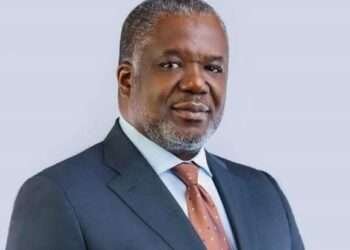The mining industry in Ghana has long been dominated by men, but in recent years, there has been a significant push to empower and incorporate women into this traditionally male-centric sector.
The Minister for Lands and Natural Resources, Hon. Samuel A. Jinapor, has expressed the government’s unwavering commitment to partnering with Women in Mining Ghana and stakeholders across the industry to drive meaningful changes for a more inclusive and prosperous mining sector that is fit for purpose.
“There is the need to come together to tweak policies and practices that promote gender equality, creating opportunities for women to advance in their careers, and fostering a culture of respect and inclusivity within mining companies”.
Hon. Samuel A. Jinapor, Minister for Lands and Natural Resources
Highlighting Ghana’s rich mining history and its pivotal role in the national economy, Hon. Jinapor emphasized the government’s vision to position Ghana as the primary hub of Africa’s mining activities.
Regarding economic empowerment, Hon. Jinapor pointed out the substantial contributions of women to the mining sector, citing examples of local content initiatives such as catering services, which generate significant revenue, as much as 2 million dollars and over.
The Ghanaian government has played a vital role in promoting gender equality in the mining industry. It has implemented policies and initiatives to encourage women’s involvement and create an enabling environment for their success.
For instance, the Ministry of Gender, Children, and Social Protection has implemented programs to train and equip women with the necessary skills for jobs in the mining sector. Additionally, the government has collaborated with international organizations to provide funding and technical support for women-led mining ventures.
The Minister, Hon. Jinapor emphasized the importance of creating opportunities for women to participate in all aspects of the industry, especially in the ranks of administration, from entry-level positions to leadership roles, highlighting the need for training and education support in fields like geology and chemical engineering.
“So, I charge the Women in Mining to pay particular attention to training because Part of inclusion is training and educating the women to become part of the process from the very beginning. Taking relevant programs that will make them qualified from the word go so that there is no reason not to include them”
Hon. Samuel A. Jinapor, Minister for Lands and Natural Resources
The Minister in his statement reaffirmed the ministry’s commitment to fostering an environment conducive to women’s advancement, echoing the sentiment that when women succeed, the nation prospers.
Challenges and the Way Forward
Despite the progress made, empowering women in the mining industry in Ghana is not without challenges. Societal and cultural biases, stereotypes, and limited access to finance and resources remain significant hurdles. Addressing these challenges requires a collaborative effort from mining companies, government, civil society organizations, and communities to create an enabling environment that supports gender equality.
Mrs. Judy Nakuor Crayem, CEO of Rapport Services and Member of the Board of the Minerals Commission in addressing the state of women in artisanal mining noted that although women constitute 50% of labor in the mining sector, they are left out in critical decision-making in the industry.
Mrs. Judy Nakuor affirmed that challenges faced by women can be dealt with by providing a level playing field without discrimination for all women in the sector.
Additionally, the President of Women in Mining, Ghana, Mrs. Georgette Barnes Sakyi-Addo’s statement explained that after significant research made, aimed at shining light on the realities faced by women in the mining sector, challenges such as access to information, financial resources, and inadequate policies to support active involvement have been identified.
Mrs. Georgette Barnes Sakyi-Addo continued that the policy dialogue is not just to acknowledge the challenges, but to focus on actionable solutions.
She called on all stakeholders and participants to take the agenda of diversity, inclusion, and belonging forward, not just within borders but to the broader African Union and ECOWAS. “Let us make this a collective effort, a united stand for a more inclusive and prosperous mining sector.”
The empowerment of women in the mining industry is crucial for sustainable development, economic growth, and social progress in Ghana. By enabling women’s full participation, the industry can leverage their unique skills, perspectives, and experiences to drive innovation, improve decision-making processes, and foster a more inclusive sector.
Ghana must continue to implement and strengthen policies that promote gender equality, while also addressing the systemic barriers that hinder women’s full participation. With concerted efforts and collective action, Ghana can pave the way for a more equitable and prosperous mining industry that benefits both women and the nation as a whole.
READ ALSO: Culture and Religion, Limitations to Women’s Empowerment





















